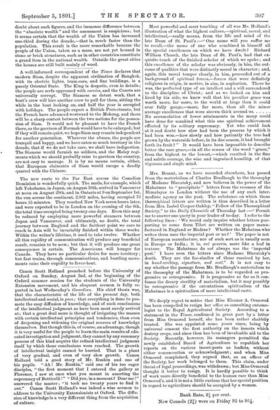Most powerful and most touching of all was Mr. Holland's
illustration of what the highest culture,—spiritual, moral, and intellectual,—really means, from the life and mind of the late Dean of St. Paul's :—" One name will you suffer me to recall,—the name of one who combined in himself all the special excellences on which we have dwelt ? Richard William Church, the late Dean of St. Paul's, had that ex- quisite touch of the finished scholar of which we spoke ; and this excellence of the scholar was obviously, in him, the out- come of qualities that were distinctly moral in character ; and, again, this moral temper clearly, in him, proceeded out of a background of spiritual forces,—forces that were definitely religions in origin, in motive, in aim, in aspiration. There he was, the perfected type of an intellect and a will surrendered to the discipline of Christ ; and as we looked on him and lived by his side, we knew well that his peculiar grace was worth more, far more, to the world at large than it could ever fully gauge,—more, far more, than all the minor average excellences that were strewn thick around us No accumulation of lower attainments in the many could have done for mankind what this one spiritual achievement effected by its solitary supremacy. Yet who could look at it and doubt how slow had been the process by which it had been won,—how slowly and how patiently the tree had grown by the waterside before, in its due season, it had brought forth its fruit ? " It would have been impossible to describe better the rare grace,—in all the senses of the word " grace," from the highest to the lowest,—which resulted in the fine and subtle courage, the wise and ingrained humility, of that vigorous and single mind.


































 Previous page
Previous page